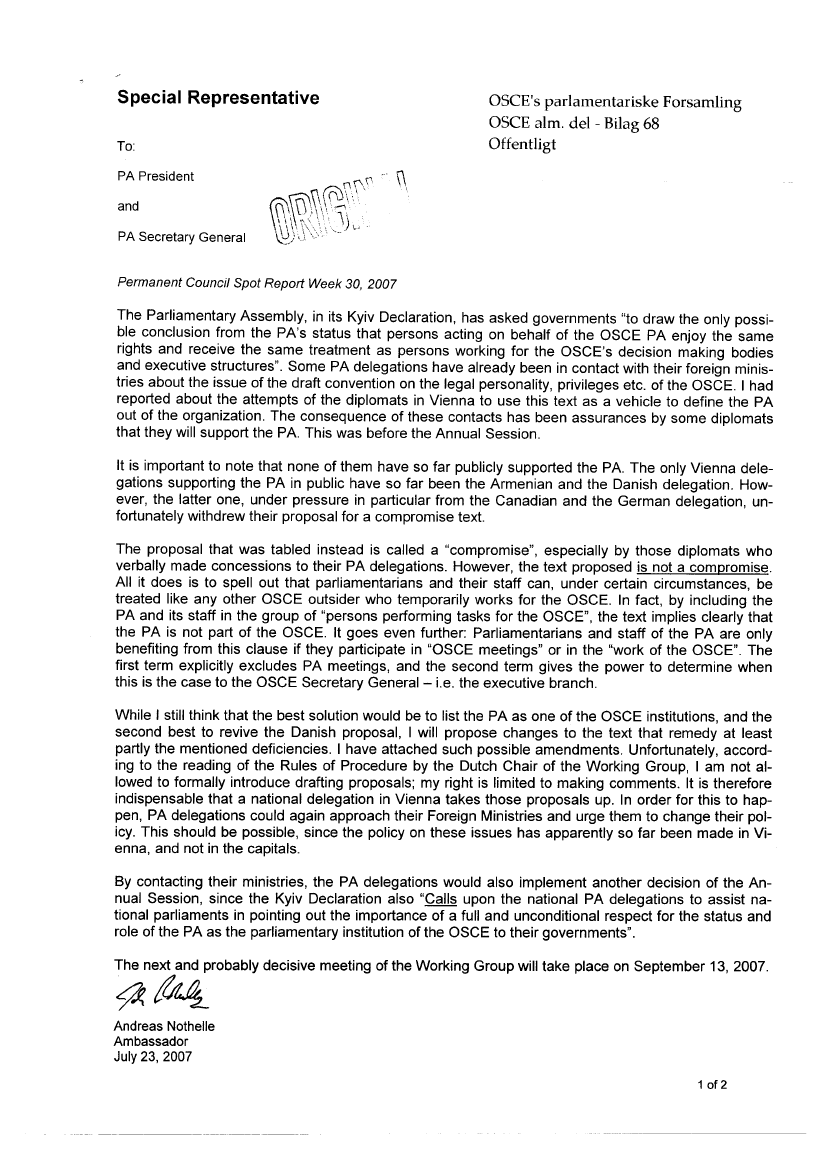
Special Representative
To:
PA President
and
PA Secretary General
Permanent Council Spot Report Week 30, 2007
OSCE's parlamentariske Forsamling
OSCE alm. del - Bilag 68
Offentligt
The Parliamentary Assembly, in its Kyiv Declaration, has asked governments "to draw the only possi-
ble conclusion from the PA's status that persons acting on behalf of the OSCE PA enjoy the same
rights and receive the same treatment as persons working for the OSCE's decision making bodies
and executive structures". Some PA delegations have already been in contact with their foreign minis-
tries about the issue of the draft convention on the legal personality, privileges etc. of the OSCE. I had
reported about the attempts of the diplomats in Vienna to use this text as a vehicle to define the PA
out of the organization. The consequence of these contacts has been assurances by some diplomats
that they will support the PA. This was before the Annual Session.
It is important to note that none of them have so far publicly supported the PA. The only Vienna dele-
gations supporting the PA in public have so far been the Armenian and the Danish delegation. How-
ever, the latter one, under pressure in particular from the Canadian and the German delegation, un-
fortunately withdrew their proposal for a compromise text.
The proposal that was tabled instead is called a "compromise", especially by those diplomats who
verbally made concessions to their PA delegations. However, the text proposed is not a compromise.
All it does is to spell out that parliamentarians and their staff can, under certain circumstances, be
treated like any other OSCE outsider who temporarily works for the OSCE. In fact, by including the
PA and its staff in the group of "persons performing tasks for the OSCE", the text implies clearly that
the PA is not part of the OSCE. It goes even further: Parliamentarians and staff of the PA are only
benefiting from this clause if they participate in "OSCE meetings" or in the "work of the OSCE". The
first term explicitly excludes PA meetings, and the second term gives the power to determine when
this is the case to the OSCE Secretary General — i.e. the executive branch.
While I still think that the best solution would be to list the PA as one of the OSCE institutions, and the
second best to revive the Danish proposal, I will propose changes to the text that remedy at least
partly the mentioned deficiencies. I have attached such possible amendments. Unfortunately, accord-
ing to the reading of the Rules of Procedure by the Dutch Chair of the Working Group, I am not al-
lowed to formally introduce drafting proposals; my right is limited to making comments. It is therefore
indispensable that a national delegation in Vienna takes those proposals up. In order for this to hap-
pen, PA delegations could again approach their Foreign Ministries and urge them to change their pol-
icy. This should be possible, since the policy on these issues has apparently so far been made in Vi-
enna, and not in the capitals.
By contacting their ministries, the PA delegations would also implement another decision of the An-
nual Session, since the Kyiv Declaration also "Calls upon the national PA delegations to assist na-
tional parliaments in pointing out the importance of a full and unconditional respect for the status and
role of the PA as the parliamentary institution of the OSCE to their governments".
The next and probably decisive meeting of the Working Group will take place on September 13, 2007.
Andreas Nothelle
Ambassador
July 23, 2007
1 of 2